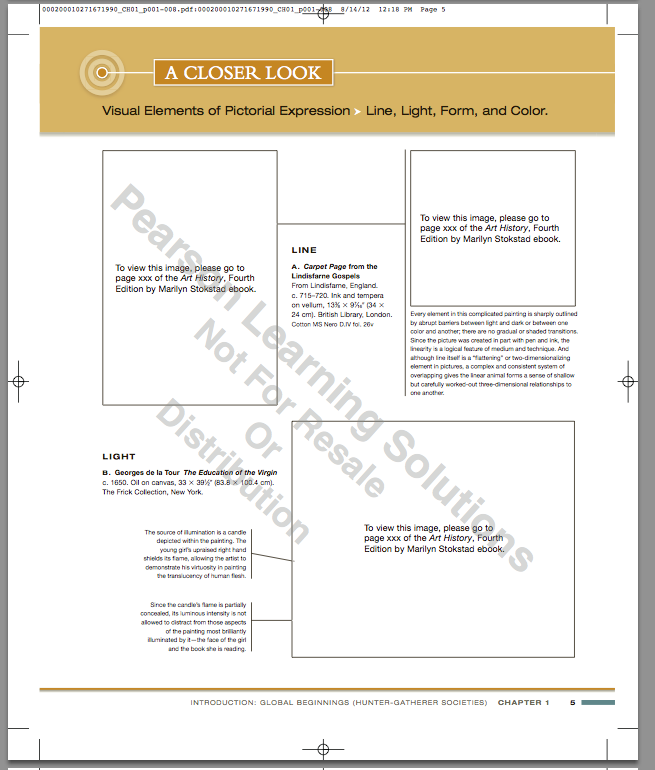Note: The misunderstandings that led to this issue have been addressed by OCAD University as detailed in the updates at the bottom of this article, however as I find out, It’s As Bad As That And Worse
There is a lot of discussion over on Techdirt about this, and I’ll post any pics of the book and its contents here when I have them.
My daughter started at OCAD University this fall.
One of her main required courses is Global Visual and Material Culture: Prehistory to 1800 which, as you might guess, requires a $180 textbook.
Students are required to buy the newest version of this textbook, presumably because as you well know, stuff that happened in the period spanning Prehistory to 1800 changes every year.
This year, however, the textbook for Global VISUAL and Material Culture has no pictures. Students have been told that the publisher couldn’t get the copyright permissions settled in time for the print run, so students will have to read the book, and see the pictures online by following along on their computer.
There is no discount on the $180 price for an ART textbook that has NO PICTURES. Devoid of pictures. Bereft of art. If I am going to have to pay $180 for an art history book that is of no resale value to next year’s students, it had damn well better be an excellent visual reference with hard cover and full colour plates, to keep around for years, festooning my coffee table and that of my heirs.
Someone has started a petition against this idiocy. I’ve signed it because I’m not particularly interested in paying any amount for an imageless art history textbook.
I’d be interested to know how this wasn’t an issue with the book last year (or any previous year for that matter), and which Renaissance painter rose from the dead to claim copyright.
I thought Canadian universities had figured this all out but it seems they’re still waffling, and if and how that relates to textbooks I’m not sure.
Update:
From what I can gather so far, this is a new book that one commenter on the petition calls “perfectly geared to this course”. I’m not sure whether that means it was specifically written and published to be used for this course, but its early incomplete release seems to be aimed at making it available for this semester. Since another book was used last year for the same course, I cannot see why last year’s curriculum could not be followed until the new book is ready rather than introducing a new curriculum based on an incomplete and rushed-out publication. How is it that the instructor is so committed to this particular text that this very peculiar choice would have been made?
OCAD Response:
Below is the relevant section from a letter to the students of this class from the dean. An open discussion has been scheduled for this week to help the students to understand the issues. I’m glad to see the school is taking steps to address the concerns raised due to the poorly communicated change in resource material.
Global Visual & Material Culture: Beginnings to 1800 is a custom textbook that basically combines three
textbooks into one:
1. Art History, 4th ed. by Stokstad and Cothren – excerpts from the full 1150-page text.
Volume One would retail for $144.
2. Graphic Design History: A Critical Guide, 2nd ed. by Drucker/McVarish – excerpts.
This volume would retail for $92.
3. A custom reader with all the additional material we have added (which includes printed images)and would cost approximately $65 – $75 (see page iii of text for list of items).
You have also been given access to electronic versions of the full Stokstad/Cothren and Drucker/McVarish texts with all the images.
The book is complete as printed and is not missing pictures because we didn’t get copyright clearance in time. If we had opted for print clearance of all the Stokstad and Drucker images, the text would have
cost over $800.



